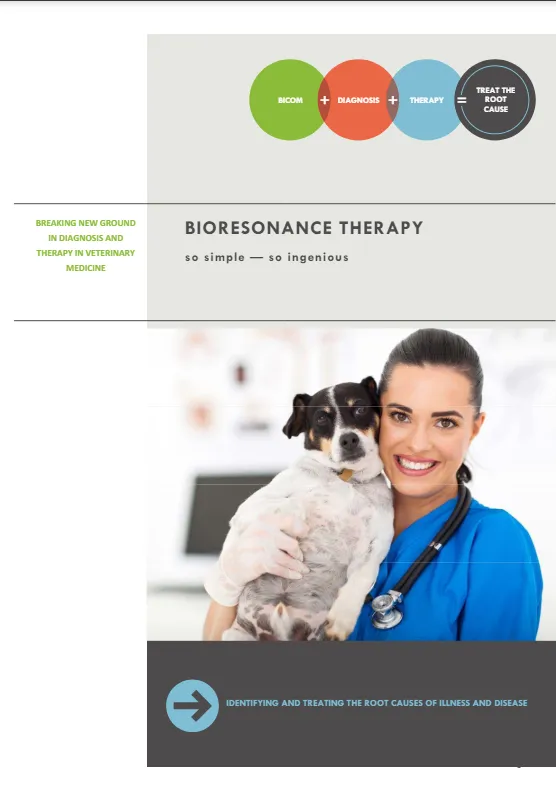BICOM® Bioresonance
Stress-free for pets and pet owners Suitable for all types of animals
There are many dogs , cats and horses suffering from health problems worldwide.
Be it problems with the musculoskeletal system, allergies and food intolerances or chronic diseases.
Sometimes, as an animal owner, you are at a loss when you can’t get any further with conventional therapy methods.
Like acupuncture or homeopathy, bioresonance belongs to the field of complementary medicine and is intended to be a useful supplement to conventional medicine.
It works with the body’s own wavelength of the four-legged friend, is used without medication and is painless to use.
Of course, not all health problems can be resolved with bioresonance. It is best to talk to a veterinarian or animal naturopath.
With our therapist finder you can find the nearest practice that can offer you BICOM® bioresonance.
Pain-free testing and therapy
Treatment with the BICOM® device is painless and stress-free. Especially sensitive animals feel very comfortable and it often happens that they completely relax and come to rest during the therapy.
Bioresonance has no harmful side effects and is used without medication.
Occasionally, initial aggravations, in what is known as the body’s initial reaction, can occur. However, these fade away after a short time.
What Pet Owners are saying..

Bioresonance Therapy And Lactose Intolerance
Lactose intolerance is a truly unpleasant condition to suffer from. A patient that has been declared lactose intolerant means lactose cannot be properly digested by their body. Lactose is a particular form of sugar that is naturally found in milk, as well as dairy products that are produced from milk. WebMD explains that it is essential to note that being lactose intolerant does not make a patient allergic to milk products, but only means their body cannot process a particular natural sugar found in milk products. There are some concerns amongst patients who suffer from this condition; thus methods to reduce the body’s intolerance to milk and milk products if often researched.
Complications Of Lactose Intolerance
The major complication that being lactose intolerant poses to the human body is the fact that milk and milk products are often the primary source of calcium in the diet of most people. When a person is unable to digest the lactose content of milk, it also means they can only consume a very small amount of milk – if any at all. With this in mind, being lactose intolerant puts a person at a much higher risk of becoming calcium deficient.
Calcium deficiency can be a serious health concern as this particular mineral is vital for maintaining strong and healthy bones. According to Healthline, an inadequate amount of calcium in the human body can lead to a higher risk of developing certain problematic health conditions, including osteoporosis and osteopenia. Hypocalcemia, also called calcium deficiency disease, is another condition a person is at a higher risk of when they do not consume an adequate amount of foods to maintain healthy calcium levels.
Symptoms Of Lactose Intolerance
Lactose intolerance can cause some unpleasant symptoms to develop, but these symptoms only become present after a person has consumed a product that contains lactose – this includes cow’s milk or any product produced from cow’s milk. Mayo Clinic explains that a person usually starts to notice the symptoms of lactose intolerance after approximately 30 minutes of consuming such a product. The symptoms may be delayed by as much as two hours before they become present.
The most common symptoms that a person may experience after consuming a product that contains the lactose natural sugar includes abdominal cramps, gas and bloating. Some people also find that dairy products cause them to experience diarrhea. Nausea is also a relatively common symptom. In rarer cases, a person may also vomit after becoming nauseous.
Potential Causes Of Lactose Intolerance
Lactose intolerance is caused by either the absence of lactase or a deficiency of lactase, a particular enzyme that is responsible for breaking down lactose into galactose and glucose. When the body does not have an adequate level of lactase, it usually leads to symptoms related to lactose intolerance when the patient consumes any product that contains lactose.
In rare cases, a patient may experience lactose intolerance due to their genetic makeup. In such a case, they would not have any lactase enzymes in their gastrointestinal tract. Lactose intolerance usually becomes present later in life, however, and is often caused by certain health conditions that affect the gastrointestinal tract. There are also certain types of medication that can affect lactase levels in the gastrointestinal tract.
According to eMedicine Health, common conditions that leads to a deficiency of lactase enzymes include Chron’s disease diabetic enteropathy, celiac disease and gastroenteritis.
How Lactose Intolerance Is Treated
For those who have been diagnosed with lactose intolerance, it may be unfortunate to learn that there is no cure for this particular disorder. It is, however, possible to control the condition through diet changes. Patients who have no lactase present in their gastrointestinal tract should try to avoid dairy products and obtain their calcium from alternative sources, such as other foods that are high in calcium or through supplements. Individuals with a lactase deficiency may still be able to include dairy in their diet, but they should limit the amount of dairy products they consume. NHS Choices report that there are some products that are available in a lactose-free option.
Bioresonance Therapy And Lactose Intolerance
When it comes to food intolerances, bioresonance therapy offers a method for identifying multiple intolerances in one single session. This particular technique has been used by thousands of people. Since the symptoms associated with lactose intolerance may be caused by another particular problem as well, it is important for patients to obtain an accurate diagnosis. With the use of bioresonance therapy, a patient is able to determine whether their symptoms are, in fact, caused by a low lactase level, when another intolerance may be to blame, or whether it is a completely different condition they are suffering from.
Conclusion
Being lactose intolerant can cause numerous uncomfortable gastrointestinal symptoms, such as bloating, gas and abdominal pain. The condition can be present from birth, or develop later in life due to the use of medication or the development of certain diseases that affect the gastrointestinal tract. Diagnosing the problem is the first step to controlling the symptoms. Bioresonance therapy offers patients an opportunity to identify the potential of low lactase levels, as well as the opportunity to uncover other types of intolerances which may also be contributing to the particular symptoms they are experiencing.
To find a vet near you please complete the form below
Quick Links








Facebook
Instagram
Mail